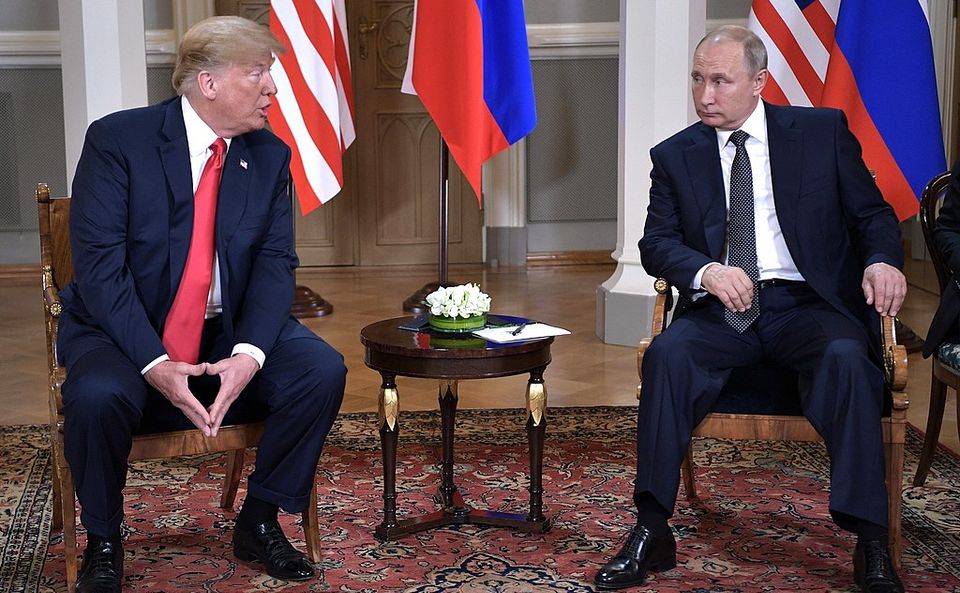
What Trump Failed to Say in Helsinki
US President Donald Trump and Russian President Vladimir Putin met Monday in Helsinki for the first official meeting between the two leaders. At the summit, President Putin stated that “establishing peace and reconciliation” in Syria is of mutual interest to the United States and Russia and that these tasks “could be the first showcase example of successful joint work.” In response, President Trump did not mention that such work must be inclusive of a transition plan, exemplifying the growing trend in US policy to cede influence in Syria and accept the Russian-Syrian narrative that the conflict is winding down to the pre-conflict status quo. By doing so, President Trump undermined the United States’ previous efforts to endorse and support the Geneva Communique and UN Security Council Resolution 2254. If left unchecked, the Syrian government will continue to commit widespread atrocities while implementing blanket solutions to systemic problems, hindering long-term peace, obstructing the potential for justice, and threatening the burgeoning civil society that has taken root in Syria since 2011.
While media focus is currently on Helsinki, the Syrian government has taken a number of significant steps in recent months on refugee return, reconstruction, and missing people in ways that are already having a worrying impact. The Syrian government began facilitating refugee return in June. Although many experts and groups, including SJAC, warned against hasty returns, Lebanon was quick to register 3,000 refugees who allegedly volunteered to be transferred back to Syria. The Syrian government, however, only approved a few hundred of those registered, and largely excluded men from the list of those approved, likely based on security concerns. Despite the July 3rd public call for refugees to return, at such a rate, Syria is demonstrating that it will likely be unwilling to accept and resettle the vast majority of the five million Syrians who fled the country. For those who do return, Syria passed Law 10 on April 2nd to re-zone areas destroyed by conflict, dictating that after the government announces a redevelopment zone, those with property claims must prove a right to property by submitting documentation. The Law appears designed to obstruct future return and restitution efforts given that a large percentage of the population is displaced, unable to return to Syria, do not have proper documentation for their claims, and are unable to submit files via proxy due to the government’s restrictions on power of attorney designations.
The Syrian government is pursuing quick solutions which fail to adequately address complicated issues in other areas as well, including with regard to detainees and torture. The government updated civil registry records for hundreds of detained Syrians in early July, listing them as dead as a result of heart failure, infectious disease, or “natural causes.” These patterns indicate that the Syrian government has no intent of providing substantive redress to the families of victims, instead attempting to prevent any attempt at meaningful justice by exercising unilateral control of the situation.
In the foreground of these developments is the Trump-Putin summit. Though it is unknown what was discussed in the meeting itself, the press conference gave some indication of the two leaders’ disregard for a detailed consideration of the Syrian context. Speaking generally of the need to “help the people of Syria get back into some form of shelter and on a humanitarian basis,” President Trump failed to acknowledge the inadequacy of current policy and the complexity of the situation on the ground. President Trump’s unprecedented direct attacks on Syrian military facilities following the use of chemical weapons on two occasions, in April 2017 and April 2018, suggested that the US might take a firm position on egregious atrocities in Syria. However, it seems they were a selective response and that other war crimes or crimes against humanity will not receive rebuke or be followed by serious calls for justice.
Additionally, the US has ceded its role as a guarantor of a July 2017 ceasefire agreement it previously helped negotiate. Instead of following through on a warning of “firm and appropriate measures” in response to any escalation of force, the United States has stood by as the Syrian government and its allies overtook the remaining rebel-held strongholds in Daraa, which displaced more than 330,000 civilians. The US denounced the attacks but made no further attempt to respond. President Trump also threatened to withdraw forces from Syria prior to his meeting with Putin, indicating that he is willing to relinquish control to the Syrian government with no conditions attached. The US is not only receding militarily; in late March, the US froze $200 million in stabilization funds directed toward clearing debris, demining, and infrastructure projects. Despite past commitments to UN-led peace efforts and the transitional justice process as a whole, the US now seems determined to make a quick exit from Syria with no regard to the situation it is leaving behind.
President Trump’s intent to abandon previous US policy will likely enable Assad to continue to implement blanket solutions which fail to address the complex needs of Syrians. Efforts of the UN Security Council (in particular Resolution 2254) are weakened in the absence of international commitment to the outcome of the Syrian conflict. Rather than relinquish all leverage to Russia, a country which has repeatedly stymied justice efforts and that the UN Commission of Inquiry has found to be complicit in war crimes, President Trump should have instead worked closely with allies to craft a long-term vision for dealing with the immense challenges posed by the Syrian conflict. In the absence of US leadership, it is time for European states to fill the vacuum of influence to prevent Russian interests in Syria from going unchecked.
For more information or to provide feedback, please contact SJAC at [email protected] and follow us on Facebook and Twitter.